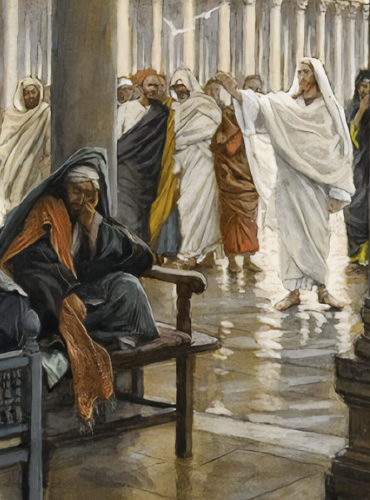Monday of the 21st Week in Ordinary Time – Mt 23:13-22
Today’s Gospel begins Christ’s discourse against the scribes and Pharisees, a discourse that occupies the Gospels through Wednesday. What calls our attention in a particular way is the use of the word blind, and the discourse on swearing.
The word that Jesus uses for blind derives from the word for smoky, meaning, raising a smoke.[1] We can think of our term smoke screen, meaning, something intended to confuse and mask what is really going on, to cover up the truth. It calls to mind Saint Ignatius’ image in the Exercises when, in the meditation on the Two Standards, he presents Satan as “seated on a great throne of fire and smoke.” The smoke is the confusion he uses to masks his plans, and the unsubstantial nature of his offers and rewards.
It is in this context, then, of masking the truth, that Christ criticizes the scribes and Pharisees. Indeed, historians tell us in Christ’s time, the art of evasive swearing had become quite refined: “the Jews divided oaths into two classes, those which were absolutely binding and those which were not.” In the example Christ gives, a man could say, “I swear by the altar of the Temple that I will pay you back,” and not have to worry in the least about fulfilling the promise; yet, if he said, “I swear by the gold of the altar of the Temple that I will pay you back,” he would find himself constrained by his vow to make repayment. To swear by the heavens, for instance, entailed no commitment. The general principle was that, if God was specifically invoked as a partner or a witness to the oath, then it was binding; if He were left out, as it were, of the transaction, then nothing had to be done.
The whole situation is rather absurd, and Jesus points this out. Basically, the Pharisees and scribes have perfected the art of lying and manipulation; they have refined the practice of deception, and have taught others to mask their intentions in the same way.
Jesus’ reply pulls God back into every conversation: “One who swears by the altar swears by it and all that is upon it; one who swears by the temple swears by it and by him who dwells in it; one who swears by heaven swears by the throne of God and by him who is seated on it.”
As one commentator explains [Barclay]: “In effect, Jesus is saying that, far from having to make God a partner in any transaction, no one can keep God out of any transaction. God is already there. Heaven is the throne of God; the earth is the footstool of God; Jerusalem is the city of God. . . . There is nothing in the world which does not belong to God; and therefore it does not matter whether God is actually named in so many words or not. God is there already. . . .
What does this mean for us? “Here is a great eternal truth. Life cannot be divided into compartments in some of which God is involved and in others of which He is not. . . . The fact is that God does not need to be invited into certain departments of life and kept out of others. He is everywhere, all through life and every activity of life. He hears not only the words which are spoken in his name; he hears all words; and there cannot be any such thing as a form of which evades bringing God into a transaction. We will regard all promises as sacred, if we remember that all promises are made in the presence of God.”
Today, we can ask ourselves: how well do we recall God’s presence and witness in our lives, even in the moments or things that we think are the most private or hidden? Do we remember that God sees everything we do, every thought we have? Do we live constantly in His presence?
Today, through the intercession of Mary, Queen of Heaven and Earth, let us ask for the grace to live constantly in God’s presence, knowing that He is already there and present, ready to aid us in our needs if only we ask.
[1] STRONGS NT 5185: τυφλός – τυφλός, τυφλοῦ, ὁ (τύφω, to raise a smoke; hence, properly, ‘darkened by smoke’), from Homer down, the Sept. for עִוֵּר, blind;





